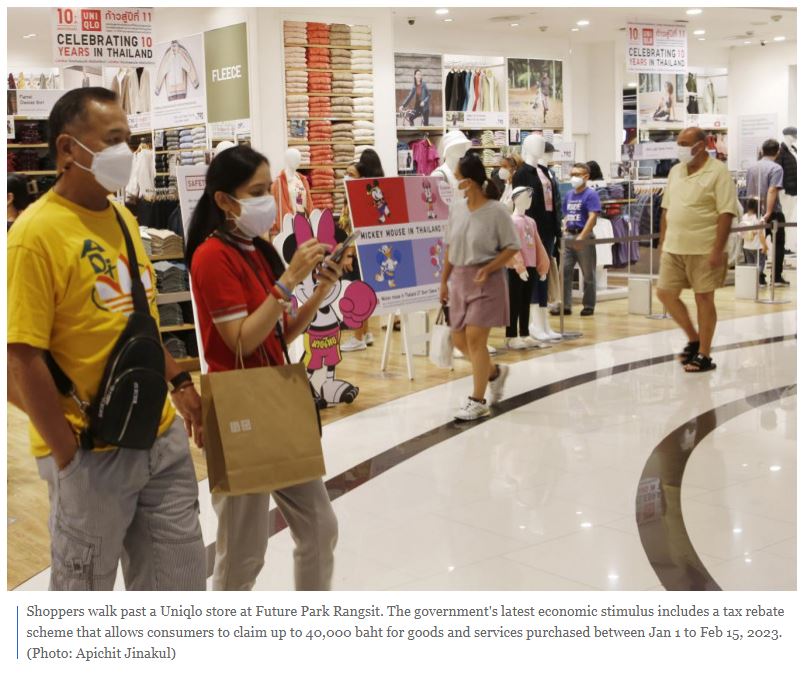Thailand: Private sector lukewarm on stimulus
The government’s latest economic stimulus packages to boost consumer spending during the New Year festive period have drawn mixed reactions from the private sector.
While retailers believe the tax rebate packages for shopping will help stimulate consumer spending and the economy, property firms said the new measures would make the market more sluggish, largely because of the loan-to-value (LTV) limit.
The cabinet on Tuesday approved a series of economic stimulus packages to increase consumer spending during the New Year period, as proposed by the Finance Ministry.
Among the approved measures is the “Shop Dee Mee Khuen” tax rebate scheme, under which consumers can claim up to 40,000 baht in tax deductions for goods and services purchased between Jan 1 and Feb 15, 2023.
The maximum spending eligible for tax deduction is split into two parts: 30,000 baht for products or services for shoppers who receive paper tax invoices, and another 10,000 baht for shoppers who ask for electronic invoices.
The measure does not cover the purchase of some products and services, including alcoholic beverages, cigarettes, cars, motorcycles, boats, hotel rooms, tour guide fees, utility bills, mobile phone bills, internet service bills and insurance premiums.
The cabinet also approved an extension of the cuts in property transfer and mortgage fees for next year, a reduction of the excise tax on jet fuel for six months until June 2023, and the exemption of sales licences for liquor, tobacco and playing cards.
GOOD FOR RETAIL
Voralak Tulaphorn, chief marketing officer of The Mall Group Co, said as a retailer, the Mall fully supports the renewal of the Shop Dee Mee Khuen tax rebate scheme.
Previous versions of this campaign helped stimulate spending and many kinds of products and services received a boost, said Ms Voralak.
The packages will help increase domestic consumption while the country waits for the return of Chinese tourists, she said.
“The tax rebate scheme should encourage local shoppers’ spending early next year, with a higher spending ceiling this time,” Ms Voralak said.
She said shopping sentiment was strong and the tax rebate will help maintain it in the first quarter of 2023.
“As the timing of the package coincides with the Chinese New Year, we expect spending at our branches to increase by 10- 20% from normal during the campaign period,” Ms Voralak.
Pattaphong Iamsuro, chief commercial officer at Big C Supercenter, said consumers normally spend more money at year-end than early in the year, so the tax incentive should help to encourage spending during the Chinese New Year in 2023.
Sompong Rungnirattisai, chief executive of Lotus’s Thailand, said the company welcomes the tax rebate scheme because it will help to boost shopping sentiment and maintain the spending momentum from the year-end period.
Lotus’s has launched several promotions covering an extensive range of products, such as goods for parties, appliances and gifting solutions.
Saruntorn Asaves, head of the Shopping Center Business Division at Siam Piwat Co, a large mall operator, said the company believes the scheme will generate much support from both individuals and the private sector.
“The measure helps attract consumers as they receive real benefits from the tax reduction,” she said. “The scheme helps the economy as it continues to recover from the impact of the Covid-19 pandemic.”
Ms Saruntorn said the tax rebate scheme proved very successful in 2021, reflecting the rapid participation of customers during OneSiam’s campaign that was arranged simultaneously with Shop Dee Mee Khuen, with sales increasing by 10-15%.
She said the malls under OneSiam, comprising Siam Paragon, Siam Center and Siam Discovery, are preparing special campaigns from Jan 1 to Feb 15 in response to the government’s new economic stimulus campaign.
FROSTY RECEPTION
Meesak Chunharuckchot, president of the Thai Real Estate Association, said the property measures the government announced on Tuesday would make the market more sluggish as the Bank of Thailand will reintroduce the LTV limit starting next year.
According to the cabinet, the new property measures will cut transfer and mortgage fees from 2% and 1%, respectively, to 1% and 0.01%, for residential units priced 3 million baht or lower from Jan 1, 2023.
“The cuts ending on Dec 31, 2022, reduced transfer and mortgage fees to 0.01% each, which were better than the new measures,” he said. “But the major impact to the property market will be the termination of the eased LTV limits.”
The association expect the property market to contract by more than 10% next year because of the LTV limit changes.
The cabinet also approved a 15% discount for the land and building tax in 2023, but the market impact would be muted because the cut is minimal.
Source: https://www.bangkokpost.com/business/2465185/private-sector-lukewarm-on-stimulus


 Thailand
Thailand




